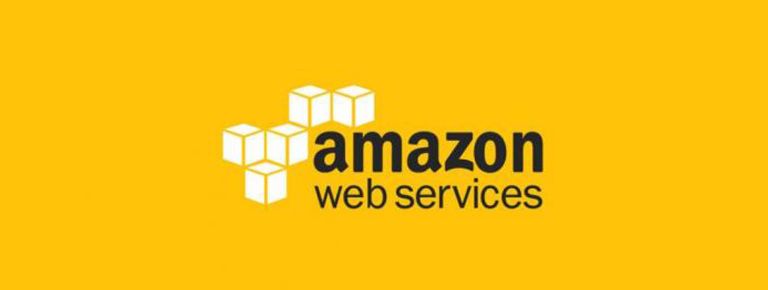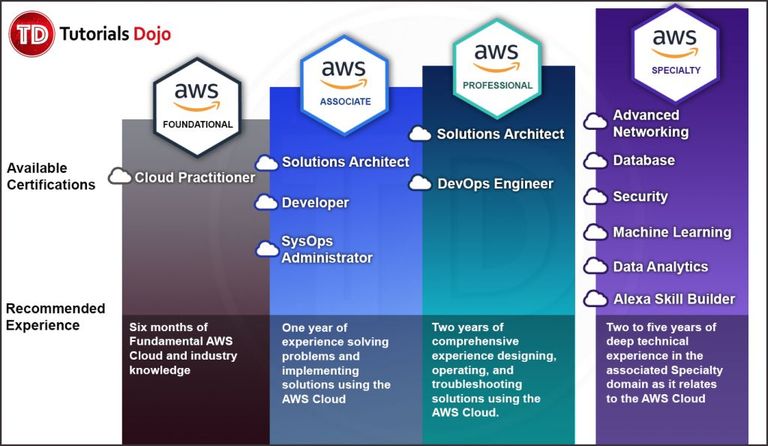-
Written ByRenan França

-
Last UpdatedSeptember 21, 2020
Is AWS certification enough to get a job in 2021?

Getting certifications in IT is still a debatable topic. Some think experience, skill, and a degree from college should be enough.
However, for anyone looking for that competitive edge, there are more pros than cons to getting certified.
Think about the Amazon Web Services (AWS) certification value in the market.
For some jobs, this kind of certification can make it easier for employers to verify and validate your skills regarding what they need for their business.
So, with that in mind, is it possible to say that AWS certification is enough to get a job in 2020?
It gives you an edge over the competition, but we need to dive into this to explain why.
In this text, we will talk about AWS, jobs, and details about each AWS certification.
Get on board! We are going to cover the following topics:
- What is an AWS certification?
- Is AWS certification enough to get a job in 2020?
- What are the different types of AWS certifications to get a job
- Which AWS certification is right for you?
- Best courses to prepare yourself for the exam’s certification
- Which AWS career path can I pursue with an AWS certification?
- 10 AWS jobs you can get with an AWS certification
- Can I get AWS certification online?
- Are AWS certifications worth it?
What is an AWS certification?

The AWS is a platform that provides scalable, flexible, cost-effective, and dependable cloud computing solutions.
Thrvices included in Amazon's platform are: Software as a service (Saas); Infrastructure as a service (LaaS); and Platform as a service (PaaS).
So, what would be an AWS certification? For those who want to work with any of this Amazon's solution, certification demonstrates a level of AWS cloud expertise you have.
The certifications are obtained by IT professionals who want to prove and validate their technical cloud skills and knowledge.
These certifications don't last forever. All of them are valid for two years and are easy to recertify as necessary.
Why is AWS certification so important?
Cloud computing is one of the biggest trends in the IT landscape. More and more organizations realize the tremendous value of storing their infrastructure, legacy systems, and cloud applications.
As the demand for cloud-based systems increases, so too makes the demand for accredited AWS professionals. This is why AWS certifications are so crucial for anyone aspiring to be a cloud computing professional.
Also, Amazon has the largest share in today’s cloud service market and is the industry leader.
Their service is one of the most reliable, secure, and dependable currently available. This is why so many IT professionals and salespeople, and managers are looking to become AWS certified.
Is AWS certification enough to get a job in 2020?

As we said before, it will give you a considerable edge over your competition!. But you have to understand that certification alone won’t guarantee you a job.
Sometimes experience, skill, and knowledge in multiple areas can also be necessary.
However, having a certification will make you stand out from the competition. Especially in job opportunities that will require you to have an AWS certification. So, if you have one (or more) certifications, it will increase your chances of success even if you are trying to get your first job.
What are the different types of AWS certifications to get a job: an overview of 12 divided into 4 levels

The four levels of AWS certification are: Foundational, Associate, Professional, and Specialty. Inside these levels are certifications to help validate your in-demand skills. They also enable organizations to build innovative and effective teams to work in cloud initiatives.
The four levels of the certifications are:
Now, let’s explain each of the certifications:
1. Foundational Level

Foundational level courses provide a high-level introduction to Amazon Web Services. It offers an overview of the general structure of AWS. For anyone looking for a place to start learning about cloud computing, this is the best place for you. This course will provide you with the necessary information to help you delve deeper into cloud computing.
a) AWS certification: Cloud Practitioners
This certification is for anyone looking to gain the necessary skills and knowledge of an overall understanding of the AWS Cloud. While optional, this certification is a recommended first step toward achieving the certifications in the next levels.
Prerequisites: At least six months of general AWS cloud experience in any role (technical, managerial, sales, etc.) is recommended.
Format: Multiple choice questions
Length: 90 minutes
Cost: 100 USD
Areas covered:
- Understanding of basic AWS architectural principles.
- The value proposition of the AWS cloud.
- Key AWS services and their common use cases.
- Basic security and compliance, the shared responsibility model for security.
- Core deployment and operating principles.
2. Associate Level

The AWS associate-level certifications are the midway point between the foundation level and the professional level. And while they are a little more complicated than the foundation level, they are nowhere near as tricky as the professional level.
This level has three options, with each option providing knowledge for three specific job roles: solutions architect, SysOps administrator, and certified developer.
a) AWS certification: solutions architect
This certification is for those who have one or more years of hands-on experience designing cost-efficient, available, scalable, distributed, and fault-tolerant AWS systems.
Prerequisites: Hands-on experience using AWS services and an ability to identify what AWS services are capable of, from global infrastructure to network technologies and security features.
Format: Multiple choice questions
Length: 130 minutes
Cost: 150 USD
Areas covered:
- Understanding of how to deploy secure and robust applications on AWS technologies.
- Best practice guidelines for implementation of cloud-based services through a project’s lifecycle.
- Implementation of architectural design principles to suit customers’ needs.
b) AWS certification: developer
This certification is for anyone who already works in a development role, and has at least a year’s experience developing and maintaining AWS-based applications. Taking this examination will test your ability to develop, natively, applications to the AWS Cloud.
Prerequisites: In-depth knowledge of at least one programming language, ability to use AWS services, and cloud-native applications to write code.
Format: Multiple choice questions
Length: 130 minutes
Cost: 150 USD
Areas covered:
- Core AWS uses, services.
- Basic best practice for AWS architecture.
- Using AWS to develop, deploy and debug cloud-based applications.
c) AWS certification: SysOps administrator
This certification is for those system administrators with at least a year’s experience looking to further validate and improve upon their skills and knowledge. It provides the necessary working knowledge of cloud computing.
This administrative course is a popular one, as certified AWS SysOps administrators are in high demand.
Prerequisites: Hands-on experience and understanding of AWS tenets, network technologies, and API/SDks tools. Knowledge of networking concepts and virtualization technology, and translating architectural requirements.
Format: Multiple choice questions
Length: 130 minutes
Cost: 150 USD
Areas covered:
- Implement and control data flow to and from AWS.
- Scalable, fault-tolerant, and highly available systems on AWS.
- Identify appropriate use of best practices for AWS operation.
- Migrating workloads on-premise to AWS.
3. Professional level

If you already have experience working with—and in—AWS, and have completed the associate level certifications, the professional level certifications are for you.
But you should have at least two years of experience using AWS as well as extensive experience designing, operating, and troubleshooting cloud-based solutions before you attempt to take these certifications.
These certifications represent the zenith of AWS certification and are deep in focus and broad in scope.
a) AWS certification: solutions architect
The solutions architect certification is where you prove you can build and deploy distributed systems in the AWS cloud. As well as have an understanding of how to deploy these systems at scale with high availability and fault tolerance. Additionally, you will have to show you’re capable of deploying multi-tier applications to the AWS cloud.
Prerequisites: At least two years of hands-on experience of AWS’s cloud architecture, CloudFormation templates, Management Console, and Billing Console. It’s also recommended you be familiar with Linux and Windows environments and scripting language.
Format: Multiple Choice Questions
Length: 180 minutes
Cost: 300 USD
Areas covered:
- Ability to migrate multi-tier, complex applications on AWS.
- Designing and deploying highly available, dynamically scalable, reliable, and fault tolerant applications.
- Implementing strategies for cost-control.
- Enterprise-wide scalable operations.
b) AWS certification: DevOps engineer
The DevOps engineer certification involves testing your ability to manage distributed applications in the AWS cloud. This includes everything from provisioning through to complete operational management.
Topics such as continuous integration and continuous delivery methodology and automation best practices will be covered. Additionally, you will need to show a working comprehension of monitoring and logging practices related to the AWS platform.
Prerequisites: You have at least the SysOps administrator or Developer associate-level certifications and a minimum of two years working and managing AWS cloud deployments.
Format: Multiple choice questions
Length: 180 minutes
Cost: 300 USD
Areas covered:
- Methodologies and delivery systems on AWS.
- Governance process, security controls, and compliance validation.
- Understanding of methodologies, operations process, modern development.
4. Specialty

AWS’s specialty certifications are a good idea if you are already highly experienced in an area of AWS. This certification level helps to validate your higher-than-average understanding of AWS and help you take the next step in your career.
a) AWS certification: Advanced networking
This certification is for anyone who already performs complex or advanced networking tasks.
Prerequisites: Amazon recommends you have a minimum of one currently valid associate-level certification before attempting this.
Format: Multiple choice questions
Length: 170 minutes
Cost: 300 USD
Areas covered:
- Basic architecture best practices for implementing core AWS services.
- Using AWS to design, develop, and deploy cloud-based solutions.
- Network architecture for AWS services.
- Tools for automating ASW networking tasks.
b) AWS certification: Database
This certificate validates your experience and expertise in all things AWS database services.
Prerequisites: a minimum of two years working on AWS as well as five years’ experience with database technologies is recommended.
Format: Multiple choice questions
Length: 180 minutes
Cost: 300 USD
Areas covered:
- Differentiate key features of AWS database services.
- Analyze requirements and needs for appropriate database solutions.
c) AWS certification: Security
This certificate is for anyone who already has a security role and has a minimum of two years of practical experience securing AWS workloads.
Prerequisites: a minimum of two years securing AWS workloads, and 5 years of IT security experience.
Format: Multiple choice questions
Length: 170 minutes
Cost: 300 USD
Areas covered:
- Specialized data classifications and data protection mechanisms.
- Secure internet protocols and data encryption methods, and the AWS mechanisms to implement them.
- Security operations and risks.
d) AWS certification: Machine Learning
This certification is for anyone who already performs complex, or advanced, Machine Learning tasks.
Prerequisites: a minimum of two years hand-on Machine Learning experience
Format: Multiple choice questions
Length: 180 minutes
Cost: 300 USD
Areas covered:
- Choosing the best ML approach for a given business problem
- Identify AWS solutions to create and deploy your ML solution
e) AWS certification: Data Analytics – 2020 (formerly AWS certification: big data)
This certification validates your expertise in AWS analytic services and data lakes. And, build confidence and credibility by demonstrating your end-to-end knowledge of AWS’ analytics solutions and the ability to deliver insight from data.
Prerequisites: minimum of two years hands-on AWS experience, as well as a minimum of five years with data analytics technology.
Format: Multiple choice questions
Length: 180 minutes
Cost: 300 USD
Areas covered:
- What AWS data analytics services are, and how they are able to integrate.
- The role of AWS data analytics in the data life cycle.
f) AWS certification: Alexa skill builder
This certificate validates individuals capable of building, testing, and publishing Amazon Alexa skills.
Prerequisites: minimum six months of hands-on-experience using Alexa Skills Kit. It is recommended you have some proficiency with (at least one) programming language.
Format: Multiple choice questions
Length: 170 minutes
Cost: 300 USD
Areas covered:
- Design the architecture and user experience to build a skill.
- Follow best practices for security of AWS and Alexa for the skill.
- Managing the publishing process as well as life cycles and skill operations.
- Developing, testing, validating, and troubleshooting.
Which AWS certification is right for you?

The right AWS certification for you depends on what your goal is. As these certifications are simply ways of helping validate and showcase your current skill level, they are more of a means to an end than an end in themselves.
If you want to stay up-to-date and know enough to explain, manage, or sell cloud-based services, then the cloud practitioner certification would help you achieve that.
If you’re looking to make a career out of cloud computing, then the associate level certifications are what you want to look at. The Certified Solutions Architect certification is one of the most valuable in obtaining a job and helping you gain new skills.
Looking to step it up a notch, get a promotion, or broaden your horizons? You want to do the SysOps administrator or developer associate-level certifications. And then, from there, go into the professional and specialty levels to stand above the rest.
Finally, if you already work in a specialized cloud computing role, the AWS specialty certifications can help you become a master in your field.
Is AWS certification difficult?
The consensus is that there is no objective answer to this question.
Your skills and experience will determine how easy or difficult you find the exams for the certifications.
With that said, they do become more difficult as you progress up the AWS certification hierarchy.
Best courses to prepare yourself for the exam’s certification

Not sure where to start? Here’s a list of the best courses you can do to become qualified enough to get genuine value out of the AWS certifications.
1. Become an AWS Cloud Developer
Cloud-based development is the future of software development. Taking this course will teach you how to build and deploy production-ready apps on AWS. You will also learn the fundamentals of AWS development and deployment.
Provider: Udacity
Instructor: Ivan Mushketyk, Justin Lee, Gabriel Rutner, and Kesha Williams.
Learn more about this course >>>
2. AWS Cloud Architect Online Course
This course will start by teaching you how to plan, design, and implement a secure cloud infrastructure in AWS. Then you will move on to doing the same for high availability infrastructure once you’ve learned that you will understand how to build secure, cost-effective, and scalable architecture before finally learning best-practice strategies for securing access to cloud infrastructure and services.
Provider: Udacity
Instructor: Tom Verbiscer, Leslie Bell, and Mehdi Razvi.
Learn more about this course >>>
3. Become an AWS Cloud DevOps Engineer
This course covered designing and deploying infrastructure as code. You will build and monitor CI/CD pipelines using Kubernetes. The course is capped off by you combining your new-found skills by completing a capstone project.
Provider: Udacity
Instructor: Kesha Williams, Carlos Rivas, Noah Gift, and Byron Sommardahl.
Learn more about this course >>>
4. AWS Certified Solutions Architect Associate
This course was designed to help you pass the certified solutions architecture – associate level certification. It will walk you through the concepts and structure of an AWS certification exam to help you more confidently pass the certification.
Provider: Pluralsight
Instructor: Elias Khnaser
Learn more about this course >>>
5. AWS Development Certification Training
This course is designed specifically to help you pass the AWS certified developer – associate level exam. It will help you master AWS services as well as gain experience developing SaaS based applications and implementing a variety of cloud-based concepts.
Provider: Edureka
Instructor: not informed
Learn more about this course >>>
If you want to learn other skills before applying for a AWS Certification test, check out our learning network to find your ideal course.
Which AWS career path can I pursue with an AWS certification?
As we said, Amazon Web Services is the leading public cloud service provider around. And, its certifications are also some of the most in-demand in the IT market. With one (or more) AWS certifications, it shows potential employers that you have valid (and valued) expertise on the AWS platform.
Some of the jobs you can get include everything from a cloud developer to a cloud manager or salesperson. There are also SysOps and DevOps engineer roles, to name just a few of the fantastic opportunities.
10 AWS jobs you can get with an AWS certification

There are over ten different jobs you can get with the help of an AWS certification? Here are ten jobs an AWS certificate can help you get:
1. Cloud developer
Cloud developers create software applications and solutions for businesses. This is why web developers with experience on the AWS platform have more job opportunities than others, especially if you get the AWS developer associate level certification. This can help you take your career to another level.
Current job openings on Linkedin (worldwide): 98.000
Current remote job openings on Linkedin (worldwide): 9.400
2. Cloud sales and purchase manager
Are you looking to work in a company that sells cloud-based technology services? Then a cloud sales and purchase manager may be the job for you. This job, which you would want an AWS cloud practitioner certification for, will help put you in a role where you can grow, drive and shape the future of a company that sells cloud-based technology services.
Current job openings on Linkedin (worldwide): 64.500
Current remote job openings on Linkedin (worldwide): 6.150
3. AWS cloud architect
An AWS cloud architect interfaces between engineers and clients as well as stakeholders and technical leadership. Their primary role is to provide technical architectures and lead implementation efforts to ensure new technologies are being adopted in a company.
Current job openings on Linkedin (worldwide): 16.000
Current remote job openings on Linkedin (worldwide): 1.200
4. SysOps administrator
An AWS systems operations administrator deploys, operates, and manages systems on the AWS platform. Suppose you already have experience and/or expertise in this field. In that case, an AWS SysOps administrator certification will help validate your expertise and help you get a job and a better salary.
Current job openings on Linkedin (worldwide): 840
Current remote job openings on Linkedin (worldwide): 92
5. Key account manager cloud
This job involves the sales management of cloud servers, products, and storage. It also consists of the responsibility of managing customer accounts large and small.
If you have managerial experience and knowledge of AWS’s cloud, you can become a key account manager, cloud, with AWS's cloud practitioner certification.
Current job openings on Linkedin (worldwide): 2300
Current remote job openings on Linkedin (worldwide): 150
6. Cloud DevOps engineer
This is a senior developer role and is for someone who also has network operations and system deployment skills. Companies are looking for people to fill this role who can set up a DevOps culture. If you already have these skills, you can become even more employable if you take the DevOps engineer certification from AWS.
Current job openings on Linkedin (worldwide): 27.000
Current remote job openings on Linkedin (worldwide): 2.900
7. AWS networking specialist
An AWS networking specialist means you can design and implement advanced hybrid or AWS network projects. If this is you, then an AWS certified advanced networking specialty level certification would help validate and showcase your skills.
Current job openings on Linkedin (worldwide): 1.200
Current remote job openings on Linkedin (worldwide): 110
8. Cloud software engineer
If you can program in Ruby, Python, C++, or JavaScript, there are plenty of AWS opportunities. The more programming languages you know and are capable of working with, the better your chances of getting a job. To improve your chances, you can undergo an AWS developer – associate level certification.
Current job openings on Linkedin (worldwide): 64.800
Current remote job openings on Linkedin (worldwide): 5.800
9. AWS big data specialist
This role involves designing and implementing big data services to derive value from data. This job requires a serious amount of data analytics experience and a technical background in AWS big data services.
There is already high demand for this job. However, for certified AWS big data specialists, you can give yourself a necessary competitive edge.
Current job openings on Linkedin (worldwide): 1.700
Current remote job openings on Linkedin (worldwide): 80
10. AWS system integrator
As one of those popular cloud services, AWS offers infrastructure, storage, networking, messaging, and other services. Since both businesses and governments rely on AWS for their cloud-based solutions, there is high demand for skilled system integrators.
If you already have a working knowledge of AWS applications, information systems, and cloud services, you are already eligible for this job. However, to be competitive, it is ideal for getting the AWS certification to show employers your skills, experience, and knowledge.
Current job openings on Linkedin (worldwide): 2.700
Current remote job openings on Linkedin (worldwide): 130
Can I get AWS certification online?
It is now possible to take your AWS certification online at home or at the office. Amazon Web Services offers the option of the exam being supervised online through a webcam. All you need is a quiet place with a reliable internet connection and only one person in the room.
You can schedule your exam 24/7, with exam times available every 15 minutes. AWS offers a system test for you to run to ensure you can complete the exam. To schedule the exam, you must select Pearson VUE as your delivery provider and then the “at my home or office” option.
Are AWS certifications worth it?

If you want to increase your earning potential, showcase your dedication to cloud-based technology and services, and be considered more employable, then yes, becoming AWS certified is worth it.
It is true that the more you know, the more valuable you become.
By taking AWS certifications, you show either current or future employers your dedication to continued education and the skill you already have.
It will make you more valuable and employable for more cloud-based jobs than someone who doesn’t have an AWS certification.

I am a journalist responsible for SEO and Content strategies at Classpert. I usually write about entrepreneurship, marketing, SEO, programming and e-learning platforms.
